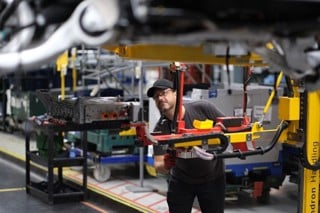The Department for Transport (DfT) intends to “provide certainty” to manufacturers by restoring the 2030 phase-out date for the sale of new petrol and diesel cars.
While there was no mention of the changes in the King’s Speech, which sets out the Government’s legislative plan, the DfT told Fleet News it intends to publish further details in “due course”.
However, with the DfT only referring to cars in its plans, it remains unclear whether the deadline will also be brought forward from 2035 to 2030 for fossil fuelled vans.
There is also uncertainty over how a new 2030 deadline will apply to both mild and plug-in hybrid electric vehicles (PHEVs), with the original legislation stating the sale of new hybrid cars and vans that can drive a “significant distance with no carbon coming out of the tailpipe” would be allowed until 2035.
The last Government had originally introduced a ban on the sale of new internal combustion engine (ICE) cars and vans from 2030 in 2020. But, in what the previous Prime Minister, Rishi Sunak, described as a “new approach to achieving net zero”, the phase-out date for sales of new ICE cars and vans was pushed back five years to 2035, last year.
During the election campaign, the Labour Party pledged to reinstate the original deadline of 2030 for cars, but made no mention of vans.
The adoption of electric vans by fleets is lagging behind that of electric cars, with the most recent registration figures suggesting a faltering electric light commercial vehicle (LCV) market.
Deliveries of battery electric vans fell for the third month this year, down 16.8% on June last year, according to data from the Society of Motor Manufacturers and Traders (SMMT).
Some 1,476 fully electric vans were registered in the month, meaning electric vans accounted for just 4.7% of all new light van registrations compared with 5.2% for the same period last year.
Electric cars, however, accounted for 19% of all new car registrations in June.
With manufacturers mandated to ensure zero emission vehicles comprise a minimum of 10% of their new van registrations this year, market share heading in the opposite direction is a cause for concern, says the SMMT.
The new transport secretary, Louise Haigh, is being encouraged to take action to boost electric van uptake by implementing measures outlined in the Zero Emission Van Plan.
In a letter to Haigh, the coalition behind the plan is calling for improved charging infrastructure with van needs in mind, removal of regulatory barriers that are preventing operators from making the switch and increased fiscal support to make new and used e-vans affordable.
Signatories to the letter include Stellantis and the Fleet News Fleet200 Strategy Network, which represents some of the largest fleet operators in the UK.
Having launched in the Houses of Parliament in February earlier this year, the Zero Emission Van Plan is the output of widespread collaboration between the British Vehicle Rental and Leasing Association (BVRLA), Logistics UK, Recharge UK, the Association of Fleet Professionals (AFP), and The EV Café.
A spokesperson for the Zero Emission Van Plan, said: “Registrations for electric vans have stalled, from an already low starting point.
“The ZEV mandate has been introduced to stimulate supply, but demand is lagging.
“Van operators are struggling to make the transition work, facing barrier after barrier across vehicle quality, performance, cost, and charging infrastructure.”
The DfT told Fleet News that the Government is committed to delivering greener transport by supporting the transition to electric vehicles (EVs), but failed to respond when asked specifically about the 2030 deadline also being reinstated for the sale of new ICE vans.
Do you think the original 2030 deadline for ending the sale of new ICE vans be should be reinstated? Vote in our poll.

























Panda - 26/07/2024 12:18
Do you think that this 2030 ban, will result in dealers pre-registering vehicles to get around the ban on the sale of 'new'vehicles?